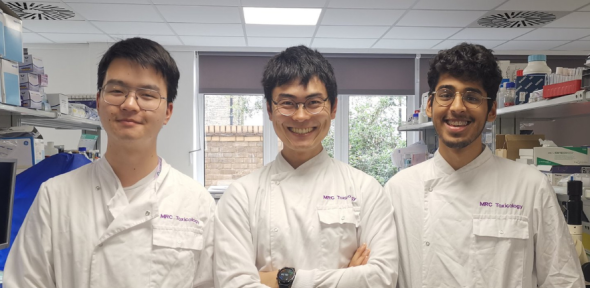
Submitted by Sophie Milbourne on Wed, 14/09/2022 - 16:38
Congratulations to Yizhou Yu, a PhD student in the Martins lab. Yizhou studies the pathways that cause Alzheimer’s disease so that we can find more affordable treatments. He presented his work so far at the Neurobiology of Brain Disorders Conference in Spain to leaders in the field. Amongst receiving great feedback and gaining many new opportunities for collaboration, Yizhou also won an award for his poster presentation and was elected as the early career Chair for the next meeting.
For the past two months, the Martins group at the MRC Toxicology Unit have hosted two third year undergraduate medical students. Chang and Yusuf have been gaining experience in the lab and also performing bioinformatics analysis. A particular success of their time at the Unit was having an abstract accepted so they recently presented their work at the Nutrition and Ageing conference organised by the British Society of Ageing and the Biochemical Society.
“This summer I was lucky enough to be working on a research project in the Martins lab here at the MRC Toxicology Unit. My project involved using bioinformatic techniques like Mendelian randomisation to look for candidate vitamins that may be protective against Alzheimer’s disease and testing my hypothesis using models of the disease in Drosophila. The lab environment was very friendly, and I had lots of support from my supervisors Yizhou and Miguel. It has been a great learning experience for me.” - Chang Liu
“Working on a research project in the Martins lab exceeded all my expectations. As this was my first foray into research, I started off feeling out of my depth. By the time I had presented to the rest of the team in their weekly team meeting (on my third day of the placement – Thanks Yizhou!) I felt much more capable, and this was all down to the expert guidance from Yizhou, Miguel and the rest of the lab. I took part in both wet lab and bioinformatics research, studying the effect of knocking-downs genes in Alzheimer’s disease in Drosophila in the former, and using Mendelian randomisation to find genes involved in Alzheimer’s progression in the latter. I’m thankful to the team and the Unit for the opportunity, and I’m excited to develop a career in which research plays a big part.” - Yusuf Adia

